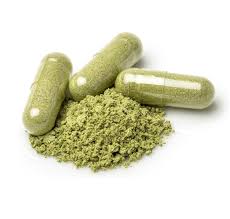The investigation has expanded to include outbreak strains from three additional serotypes of Salmonella: Salmonella Javiana, Salmonella Okatie, and Salmonella Thompson.
 The same strains of Salmonella Okatie and Salmonella Thompson were found in samples collected from kratom and from ill people.
The same strains of Salmonella Okatie and Salmonella Thompson were found in samples collected from kratom and from ill people.
47 more ill people from 25 states were added to this investigation since the last update on March 2, 2018.
At this time, CDC recommends that people not consume any brand of kratom in any form because it could be contaminated with Salmonella.
Kratom is also known as Thang, Kakuam, Thom, Ketom, and Biak.
Kratom is a plant consumed for its stimulant effects and as an opioid substitute.
CDC, public health and regulatory officials in several states, and the U.S. Food and Drug Administration are investigating a multistate outbreak of Salmonella infections.
Epidemiologic and laboratory evidence indicates that kratom is the likely source of this multistate outbreak.
No common brands or suppliers of kratom products have been identified at this time.
Because no common source of Salmonella-contaminated kratom has been identified, CDC is recommending against consuming any kratom.
Since the last update on March 2, 2018, investigators identified ill people infected with other types of Salmonella, including Salmonella Okatie, Salmonella Javiana, and Salmonella Thompson. Epidemiologic and laboratory evidence has linked these additional Salmonella illnesses to consuming kratom.
Health officials continue to collect various leftover and unopened kratom products to test for Salmonella contamination. Investigators in California collected leftover Phytoextractum brand kratom powder from an ill person in that state. The outbreak strain of Salmonella I 4,[5],12:b:- was identified in this sample. As a result of these findings, PDX Aromatics recalled kratom powder sold online between January 18, 2018 and February 18, 2018.
 Investigators in Oregon and Utah collected kratom powder from retail locations and online retailers where ill people reported purchasing kratom. Outbreak strains of Salmonella Okatie and Salmonella Thompson were identified in these samples. No brand information was available for the kratom products collected in Oregon. The ill person in Utah purchased kratom powder from the website kratoma.com.
Investigators in Oregon and Utah collected kratom powder from retail locations and online retailers where ill people reported purchasing kratom. Outbreak strains of Salmonella Okatie and Salmonella Thompson were identified in these samples. No brand information was available for the kratom products collected in Oregon. The ill person in Utah purchased kratom powder from the website kratoma.com.
State and local health officials continue to interview ill people to ask about the foods they ate and other exposures before they became ill. Forty (73%) of 55 people interviewed reported consuming kratom in pills, powder, or tea. Most people report consuming the powder form of kratom. People who reported consuming kratom purchased it from retail locations in several states and from various online retailers.
Despite the information collected to date about where ill people purchased kratom, a single common brand or supplier of kratom has not been linked to the outbreak. At this time, CDC recommends that people not consume any brand of kratom in any form because it could be contaminated with Salmonella and could make people sick. This investigation is ongoing and we will provide updates as needed.
